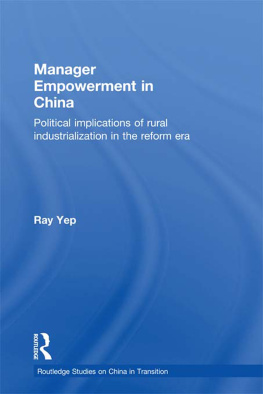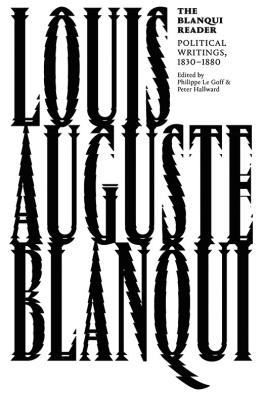Philippe Le Goff - Auguste Blanqui and the Politics of Popular Empowerment
Here you can read online Philippe Le Goff - Auguste Blanqui and the Politics of Popular Empowerment full text of the book (entire story) in english for free. Download pdf and epub, get meaning, cover and reviews about this ebook. year: 2020, publisher: Bloomsbury UK, genre: Politics. Description of the work, (preface) as well as reviews are available. Best literature library LitArk.com created for fans of good reading and offers a wide selection of genres:
Romance novel
Science fiction
Adventure
Detective
Science
History
Home and family
Prose
Art
Politics
Computer
Non-fiction
Religion
Business
Children
Humor
Choose a favorite category and find really read worthwhile books. Enjoy immersion in the world of imagination, feel the emotions of the characters or learn something new for yourself, make an fascinating discovery.
- Book:Auguste Blanqui and the Politics of Popular Empowerment
- Author:
- Publisher:Bloomsbury UK
- Genre:
- Year:2020
- Rating:5 / 5
- Favourites:Add to favourites
- Your mark:
- 100
- 1
- 2
- 3
- 4
- 5
Auguste Blanqui and the Politics of Popular Empowerment: summary, description and annotation
We offer to read an annotation, description, summary or preface (depends on what the author of the book "Auguste Blanqui and the Politics of Popular Empowerment" wrote himself). If you haven't found the necessary information about the book — write in the comments, we will try to find it.
Auguste Blanqui and the Politics of Popular Empowerment — read online for free the complete book (whole text) full work
Below is the text of the book, divided by pages. System saving the place of the last page read, allows you to conveniently read the book "Auguste Blanqui and the Politics of Popular Empowerment" online for free, without having to search again every time where you left off. Put a bookmark, and you can go to the page where you finished reading at any time.
Font size:
Interval:
Bookmark:

Auguste Blanqui and the Politics of Popular Empowerment
Auguste Blanqui and the Politics of Popular Empowerment
Philippe Le Goff

BLOOMSBURY ACADEMIC
Bloomsbury Publishing Plc
50 Bedford Square, London, WC1B 3DP, UK
1385 Broadway, New York, NY 10018, USA
BLOOMSBURY, BLOOMSBURY ACADEMIC and the Diana logo are trademarks of Bloomsbury Publishing Plc
First published in Great Britain 2020
Copyright Philippe Le Goff, 2020
Philippe Le Goff has asserted his right under the Copyright, Designs and Patents Act, 1988, to be identified as Author of this work.
For legal purposes the constitute an extension of this copyright page.
Cover design by Charlotte Daniels
Cover image Daria Botieva / EyeEm / Getty Images
All rights reserved. No part of this publication may be reproduced or transmitted in any form or by any means, electronic or mechanical, including photocopying, recording, or any information storage or retrieval system, without prior permission in writing from the publishers.
Bloomsbury Publishing Plc does not have any control over, or responsibility for, any third-party websites referred to or in this book. All internet addresses given in this book were correct at the time of going to press. The author and publisher regret any inconvenience caused if addresses have changed or sites have ceased to exist, but can accept no responsibility for any such changes.
A catalogue record for this book is available from the British Library.
A catalog record for this book is available from the Library of Congress.
ISBN: HB: 978-1-3500-7679-2
ePDF: 978-1-3500-7681-5
eBook: 978-1-3500-7682-2
Typeset by Newgen KnowledgeWorks Pvt. Ltd., Chennai, India
To find out more about our authors and books visit www.bloomsbury.com and sign up for our newsletters.
Also Available at Bloomsbury
Resistance, Revolution and Fascism: Zapatismo and Assemblage Politics , Anthony Faramelli
Spaces of Crisis and Critique: Heterotopias Beyond Foucault , edited by Anthony Faramelli, David Hancock, and Robert G. White
Hegel and Resistance: History, Politics and Dialectics , edited by Rebecca Comay and Bart Zantvoort
The Ethics of Resistance: Tyranny of the Absolute , Drew M. Dalton
The Reasoning of Unreason: Universalism, Capitalism and Disenlightenment , John Roberts
On Resistance: A Philosophy of Defiance , Howard Caygill
Contents
This book is based on a doctoral thesis submitted at Warwick University in 2015. During the subsequent process of revising, correcting and refining my initial arguments and conclusions, I have benefited enormously from the help and support of many people.
I am grateful to Liza Thompson, Lucy Russell and Lisa Goodrum at Bloomsbury for their immediate enthusiasm for the book, for their help in bringing it to fruition and for their patience along the way. An earlier and shorter version of Sections IIII of the Introduction was published in the Introduction to The Blanqui Reader (London: Verso, 2018). Thanks to Verso for their kind permission to use both this material and the quotes that serve as epigraphs in .
I would like to thank Alex Corcos, Peter Hallward, Victoria Hirst, Jussi Palmusaari and Stefano Pippa for their incisive comments on various chapters and sections, and the anonymous readers for their useful responses to the book proposal and the final draft. I owe special thanks to Nick Hewlett, who not only carefully read the entire manuscript but whose support and friendship have meant a great deal these past few years. Needless to say, I alone am responsible for any remaining errors and misunderstandings contained in the following pages.
As this project has slowly taken shape, the sound advice and steady encouragement of colleagues and students at Warwicks School of Modern Languages and Cultures and Kingstons Centre for Research in Modern European Philosophy have been extremely valuable. Many conversations about many things with Robert Lines have shaped my thinking in more ways than both he and I probably realise.
My thanks, finally, to Victoria, for her understanding, for her love.
| BR | The Blanqui Reader , eds. Peter Hallward and Philippe Le Goff (London: Verso, 2018). |
| CS1 , CS2 | Critique Sociale (Paris: Flix Alcan, 1885), 2 volumes. |
| MF | Maintenant, il faut des armes , ed. Dominique Le Nuz (Paris: La Fabrique, 2007). |
| MSS | Manuscript volume, catalogued as NAF 9578 to 9598 (Paris, Bibliothque Nationale, manuscript collections). |
| ND | Ni Dieu Ni Matre (Brussels: ditions Aden, 2009). |
| OI | uvres I: Des origines la Rvolution de 1848 , ed. Dominique Le Nuz (Nancy: Presses Universitaires de Nancy, 1993). |
Few individuals in the history of revolutionary politics have proved so controversial as Louis-Auguste Blanqui (18051881). Remembered, when remembered at all, for the ill-fated coups of May 1839 and August 1870, today Blanquis name is generally synonymous with conspiratorial organizing and putchist action, with authoritarian elitism and impatient adventurism with the Blanquism, in other words, that led him to emphatic failure during his lifetime, and that has brought him enduring infamy well beyond it.
The damning judgement of posterity was by no means inevitable, however. A leading figure of the radical left in nineteenth-century France, Blanquis political prestige grew across the major popular uprisings that spanned the course of his long and remarkable life. The insurgent in the anti-government riots of November 1827 and the Three Glorious Days of July 1830, who suffered a near-fatal bullet wound to the neck during the former and was awarded the Decoration of July by the new Orlanist regime in recognition of his role in the latter, once again took to the streets in the insurrection of 31 October 1870, when Parisians attempted to establish a new government capable of salvaging the war effort against Prussia. The orator of the early 1830s, whose passionate speeches were reproduced and circulated among the republican opposition, once again became a powerful voice in the fierce debates between the French exile community in the early 1850s, when his declarations and letters, penned from the island prison of Belle-le, made their way across Europe. The leader of perhaps the most important radical club in 1848, who insisted on the mass mobilization and organization of the people as the means by which to pressure the Provisional Government into undertaking revolutionary measures, once again called for a similar strategy during the Prussian siege of Paris in the winter of 18701, when he briefly served as head of the 169th battalion of the National Guard. Only imprisonment or illness could hinder a lifelong political and intellectual struggle against the established order a struggle that was as uncompromising in its commitment to the principles of equality and justice as it was unrelenting in its efforts to realize them. A complex and intriguing character, who left behind a wealth of unpublished writings, by the time of his death Blanqui had become arguably the centurys preeminent neo-Jacobin: one of the foremost, and certainly one of the most forceful, proponents of popular power to emerge in the wake of the French Revolution.
And yet, since his death the radical left has, on the whole, not merely overlooked and neglected Blanqui especially his writings but often turned him into an object of derision, a byword for theoretical misconception and practical misadventure. Posthumous marginalization and dismissal have eclipsed a lifetime of admiration among friends and notoriety among foes. Received wisdom, founded on the perceived futility of the political enterprise, is willing to concede little more than laudable dedication to a just cause. With few advocates or defenders, much less any followers or disciples, Blanquis project has all but fallen into the historical and political abyss.
Next pageFont size:
Interval:
Bookmark:
Similar books «Auguste Blanqui and the Politics of Popular Empowerment»
Look at similar books to Auguste Blanqui and the Politics of Popular Empowerment. We have selected literature similar in name and meaning in the hope of providing readers with more options to find new, interesting, not yet read works.
Discussion, reviews of the book Auguste Blanqui and the Politics of Popular Empowerment and just readers' own opinions. Leave your comments, write what you think about the work, its meaning or the main characters. Specify what exactly you liked and what you didn't like, and why you think so.













